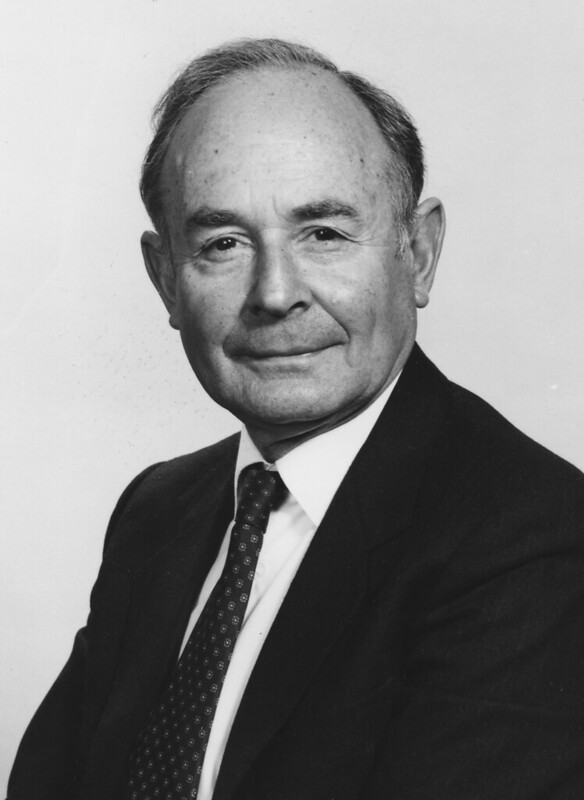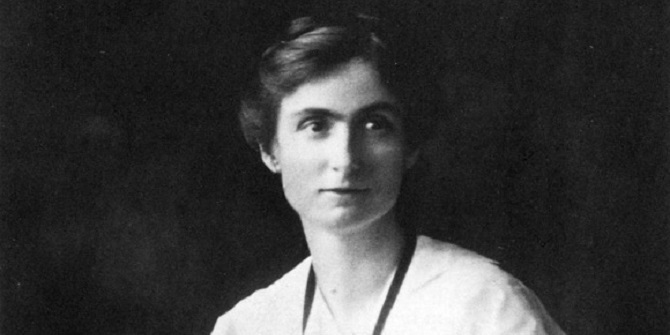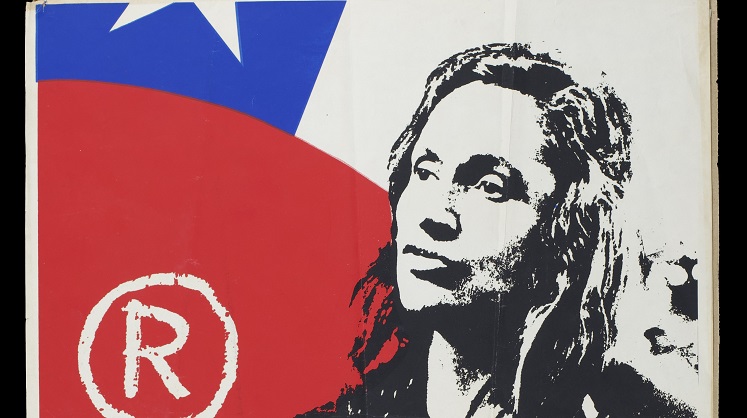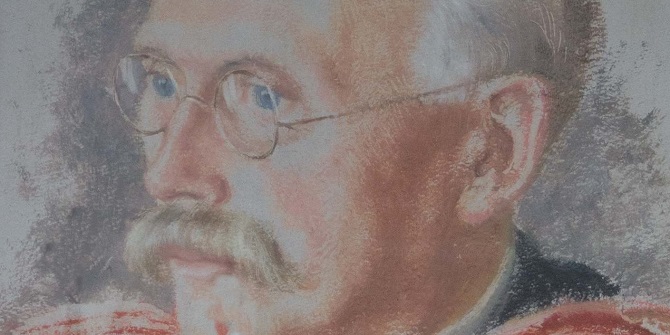Basil Yamey (1919-2020) was a member of academic staff at the Department of Economics at LSE from the 1940s to the 1980s, serving as Convenor of the department, Editor of Economica and the head of the Trade and Industry group. His research focused on the history of accounting and free markets. Originally from Cape Town, Basil settled in London where he and his wife Helen had two children. His son Adam Yamey shares his memories of his father during their time living in the Hampstead Garden Suburb.
Basil Yamey lived at 36 Hampstead Way in the Hampstead Garden Suburb from about 1950 until about 1991. Here are some random reminiscences about living at this address with my father.

His study was the largest room in the house with one window facing the garden and the other facing Hampstead Way. Far from the kitchen, it had been used as a dining room by previous owners of the building. His wooden desk was in the southwest corner of the room. He used to sit with his back facing the corner between the two windows and his face towards the doorway from the study to the rest of our home. From the early 1960s onwards, the two walls without windows were fitted with bookcases that extended from cupboards at floor level up to the ceiling. The shelves were filled with books. One of them had a long run of issues of Economica, a journal he edited.
As the years passed, piles of books and papers began growing like stalagmites from the floor. Eventually, there was little empty floorspace apart from two narrow pathways between these stacks. One led from the door to the desk and the other from the door to a telephone that rested on one of the lower bookshelves. My father had a (non-electric) typewriter, which he never used. He wrote using pens, and literally “cut and pasted” when he made corrections to his handwritten text. His desktop was as cluttered as the floor. Soon after my parents moved into the house, my father spent a great deal of time working in his study with his collaborator, the late Peter Bauer. My mother told me on more than one occasion that on some days Peter and Basil used to be closeted in the study from dawn to dusk. Occasionally, my father used to emerge to request refreshments. After some time, so my mother told me, she would call my father “Mrs Bauer”.
My mother was keen that my father should not be disturbed whilst he was working. One of my cousins, who used to visit us regularly during our childhood, remembered that my mother was constantly reminding us children to keep quiet so as not to disturb him. This was particularly the case, I remember, when my father was marking LSE examination scripts. There used to be a slightly tense atmosphere in the house during the few weeks each year when Basil was carefully inspecting the foolscap sized pages bound in coloured paper covers. I had the impression that the task of correcting the papers was one he took extremely seriously. Basil joined us at meals (lunch and dinner). During these, his mind often seemed to be far away from our dining table. My mother, my sister, and I knew it was best not to distract him from his thoughts. Whatever he was doing, if my parents were home in the evening, my mother insisted that he joined her in the living room by about 9pm. They used to listen to the 10pm news on the radio before retiring to bed.
My father was almost a workaholic. However, there were some household activities, which he seemed to enjoy. One of these was washing the dishes and cutlery after a meal. I think that he liked this activity because it was a change from his academic work, yet not an unproductive activity. When we had our first dishwashing machine installed, I think that he was a little disappointed that that he spent less time at the kitchen sink. For some mysterious reason my parents had a Permutit water softening apparatus installed in the 1960s. My mother told me that if we used “soft” water, we would use less soap. This seems to have been a ridiculous reason to install the machine. Once a week, the resin in the water softener needed to be reactivated, a process requiring several adjustments to a large knob on top of one of the two cylindrical tanks that formed the bulk of the apparatus. The water softener was kept in our garage, which was separated from the house. The process occupied several hours of every Sunday afternoon. My father used to sit at his desk and emerge at the appropriate times to turn the knob to the next position in the sequence. At the end of the process, he would put a sample of tap water into a small bottle with some red coloured soapy substance, and then shake it vigorously. This would produce a foam, which if it persisted for a given short time, proved that the process had been completed correctly. I remember my father always beaming with pleasure when this happened. Apart from these tasks and removing clinker from our boiler, I cannot remember my father being particularly practical around the house.
The only examination my father ever failed was his first attempt at the driving test. He told me that his mistake was to overtake a bus which was not moving … because it was waiting at a red traffic light, He passed the test at the second attempt. The first time he drove in our car was with my mother, a nervous passenger, and an over-cautious driver, in the passenger seat. Between our house and Meadway, a mere few hundred feet away, she had criticised his driving so many times that he never drove again.
For light reading, Basil enjoyed reading thrillers and highbrow murder mysteries. He read both the Burlington Magazine (art history and connoisseurship) and other serious art history journals on a regular basis. He was also a regular reader of the Times Literary Supplement, The New York Review of Books, Private Eye, and The Spectator. Although he frowned on Mad magazine, he enjoyed reading it when I bought copies occasionally. The Times newspaper was delivered daily. Rarely, he read The New Statesman. He had an excellent collection of high-quality, scholarly art books as well as a few antiquarian editions of books about accounting. As for music, Basil was not an enthusiastic listener. He had been a champion table-tennis player at the University of Cape Town, followed sports keenly by listening to the radio – we did not have a television. During cricket test matches, he had the radio’s “ball-by-ball” commentary on in his study, listening to it rather in the way others have music on in the background whilst they are working. He also liked following the live radio commentaries of tennis matches at Wimbledon.
We had, as mentioned, a telephone connection in the house. On more than one occasion, my father told me that the ‘phone was not for conversations, but was only to be used to impart small amounts of important information or in an emergency. In contrast, I loved chatting on the ‘phone. So did my father’s LSE colleague Kurt Klappholz. If I answered the ‘phone when he called, he used to chat with me for ages. If a topic ended and we could not think of another one immediately, Kurt used to say “yes… yes… yes…” and so on, until one of us thought of something else to talk about.
When he was at home, Basil worked in his study from morning until evening, emerging for meals and other brief activities. Every Saturday morning, the four of us used to drive up to Hampstead village. There, my parents enjoyed an espresso coffee at a now long-since closed Italian restaurant, The Pimpernel on Heath Street. Then, we used to walk down the High Street to the excellent High Hill bookshop, which closed many years ago. My sister and I were allowed to choose a book each week. My parents were keen to encourage us to read. After book shopping, we used to return homewards. When the weather was suitable, my parents used to take a brief afternoon stroll on the nearby Hampstead Heath Extension, sometimes greeting Lionel and Iris Robbins when we passed their garden. Some weekend mornings, we used to walk across the Heath to take coffee with Imre Lakatos and Gillian Paige.
My parents exchanged polite greetings with our neighbours but rarely (if ever) socialised with them, except for Mr and Mrs Terry, who lived opposite us. Mr Terry was a Jewish businessman, who owned a company that made or sold Vermiculite. After my mother died in 1980 and before Basil remarried in 1991, he began socialising with the Terry’s neighbours, Jula and Roger Westman. Elsewhere, I have described what I remember of my parent’s interactions with other LSE academics in the Suburb. Kurt and Gwyneth Klappholz held their wedding reception in our garden, a place that did not much interest my father until he became a widower. Then, he used to buy flowers to put in the house. Once, I asked him why he did not pick the flowers in the garden. He answered that he preferred to see them growing there in the garden, which was maintained by an Italian gardener who continued to carry out my mother’s instructions long after she had died.
My parents entertained a lot at home. At least once a week, they invited friends, colleagues, or relatives, home for dinner. My mother was considered a good cook and my father seemed to enjoy hosting the guests. As for cooking, Basil’s skills were minimal. When a branch of Marks and Spencer opened close to our house some years after my mother died, my father became a regular customer in the ready-meals department of the food store.
After my mother died in 1980, Basil continued to live in 36 Hampstead Way for about ten years. Years earlier, my mother had had some of the original latticed windows with small panes replaced by plain sheets of glass to allow more daylight into the house. This was against the strict rules of the Suburb, which has always been a conservation area. It was several years after she died that my father received a letter from the Suburb Trust, almost ordering him to replace the “incorrect” windows with the kind of windows that had been there before. He told me that he had wrote to the Trust, saying:
“Unfortunately, I know nothing about this. I used to leave these matters in the hands of my dear late wife.”
After that, he had no further problems with the Trust.
During his time as a widower, my father did little to maintain the house. One by one, electric lights and sockets began failing. After a while, there was no artificial lighting in his study and when there was little daylight, he used to shift to other rooms to continue working. The telephone wire became so poorly connected to the receiver that to hold a conversation the wire had to be kept still in a particular position to avoid being temporarily disconnected from the person at the other end. I asked him why he did not call repair people in to fix the various problems. His reply was that he did not want to waste time waiting for builders and technicians to turn up.
My father had a competitive streak that manifested itself in curious ways. He kept a small box of coins on the windowsill of our lavatory. When seated on the “throne”, he used to take one of the coins and flick it up in the air before catching it in the hand he had used to flick it. He repeated this over and over again, counting how many times he caught it before it dropped to the floor. Each time he did this activity, he tried to better his previous highest score. Sometime in the late 1980s, I returned to Hampstead Way to visit him. I found my father seated in the living room with a small electronic gadget in his hands. He ignored me whilst he continued playing with this electronic game. Eventually, he turned to me and explained that the object of the game was to throw coconuts at monkeys. A point was scored each time a nut hit its target. That afternoon, my father was very excited because his score was approaching 100.
As far as parenting was concerned, he left a lot of the practical side of it to my mother. If he did take an interest in what my sister and I were up to at home, he did it discreetly. When we were abroad on holiday, he interacted with us more than at home. Finally, I recall that one afternoon when I was a teenager, he said that he did not mind which career I decided to pursue in the future providing I did not become an economist. I do not know why he was against my following in his footsteps, but by then economics was not one of my many interests.
Read the Department of Economics’ hundredth birthday tribute to Basil Yamey, and his obituary by Jim Thomas on the LSE condolences blog.





